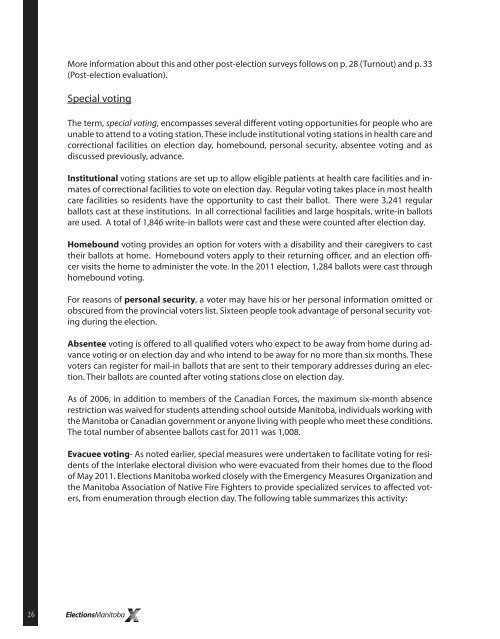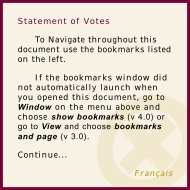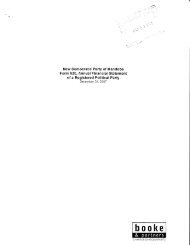Annual REPORT - Elections Manitoba
Annual REPORT - Elections Manitoba
Annual REPORT - Elections Manitoba
Create successful ePaper yourself
Turn your PDF publications into a flip-book with our unique Google optimized e-Paper software.
More information about this and other post-election surveys follows on p. 28 (Turnout) and p. 33<br />
(Post-election evaluation).<br />
Special voting<br />
The term, special voting, encompasses several different voting opportunities for people who are<br />
unable to attend to a voting station. These include institutional voting stations in health care and<br />
correctional facilities on election day, homebound, personal security, absentee voting and as<br />
discussed previously, advance.<br />
Institutional voting stations are set up to allow eligible patients at health care facilities and inmates<br />
of correctional facilities to vote on election day. Regular voting takes place in most health<br />
care facilities so residents have the opportunity to cast their ballot. There were 3,241 regular<br />
ballots cast at these institutions. In all correctional facilities and large hospitals, write-in ballots<br />
are used. A total of 1,846 write-in ballots were cast and these were counted after election day.<br />
Homebound voting provides an option for voters with a disability and their caregivers to cast<br />
their ballots at home. Homebound voters apply to their returning officer, and an election officer<br />
visits the home to administer the vote. In the 2011 election, 1,284 ballots were cast through<br />
homebound voting.<br />
For reasons of personal security, a voter may have his or her personal information omitted or<br />
obscured from the provincial voters list. Sixteen people took advantage of personal security voting<br />
during the election.<br />
Absentee voting is offered to all qualified voters who expect to be away from home during advance<br />
voting or on election day and who intend to be away for no more than six months. These<br />
voters can register for mail-in ballots that are sent to their temporary addresses during an election.<br />
Their ballots are counted after voting stations close on election day.<br />
As of 2006, in addition to members of the Canadian Forces, the maximum six-month absence<br />
restriction was waived for students attending school outside <strong>Manitoba</strong>, individuals working with<br />
the <strong>Manitoba</strong> or Canadian government or anyone living with people who meet these conditions.<br />
The total number of absentee ballots cast for 2011 was 1,008.<br />
Evacuee voting- As noted earlier, special measures were undertaken to facilitate voting for residents<br />
of the Interlake electoral division who were evacuated from their homes due to the flood<br />
of May 2011. <strong>Elections</strong> <strong>Manitoba</strong> worked closely with the Emergency Measures Organization and<br />
the <strong>Manitoba</strong> Association of Native Fire Fighters to provide specialized services to affected voters,<br />
from enumeration through election day. The following table summarizes this activity:<br />
26





